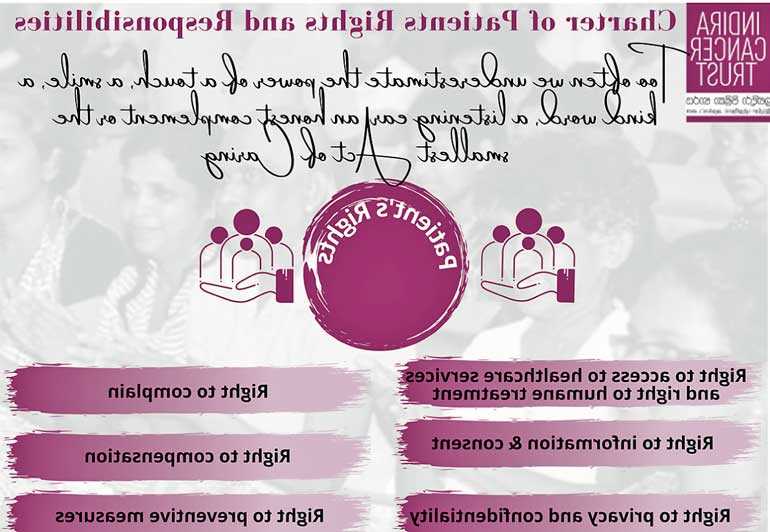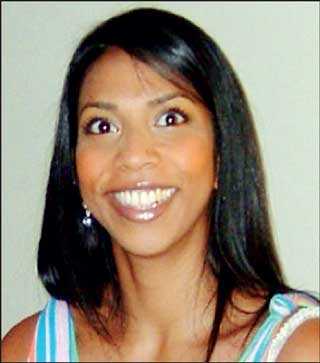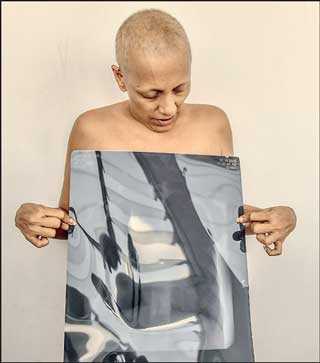Thursday Feb 26, 2026
Thursday Feb 26, 2026
Wednesday, 3 February 2021 00:00 - - {{hitsCtrl.values.hits}}

By Dr. Lanka Jayasuriya-Dissanayake
 |
| The setting up of Indira Cancer Trust in 2016 was centred around the ‘care’ my sister, Indira, received in the last stage of her life |
 |
| There are many more patients like Natalie facing similar problems and Natalie’s fight should not be a lone battle to change a system
|
It was indeed disturbing to have read about Natalie’s battle with cancer and the numerous other difficulties she faced in the last few months, outlined in an article in Daily FT on 22 January. Her
strength and courage to speak out on these matters when the majority are silent is again a show of her strength. We at Indira Cancer Trust reach out to you in an attempt to support you through your journey with cancer.
Acts of caring
Too often we underestimate the power of a touch, a smile, a kind word or the smallest act of caring, all of which have the potential to turn a life around.
The setting up of Indira Cancer Trust in 2016 was centred around the ‘care’ my sister, Indira, received in the last stage of her life. Indira was a mother of two young children who fought her battle with breast cancer with so much of zest and a constant smile. Her last stages with cancer were comfortable and pain free due to the support and care from the team looking after her in hospital in the UK.
Our family witnessed the last seven days of her life in the hospital at her bedside, unconscious yet comfortable, peaceful, pain free and with no unnecessary interventions. Our father was at her bedside every single day holding her hand from morning to night, wishing for a miracle or at least another day to see his daughter as herself with that beautiful smile. We were all there in that small hospital room and as much as it was the most difficult time for us the support was tremendous. The care towards both patients and relatives was unforgettable.
Indira Cancer Trust
My sister passed away on 2 November 2016. My father flew to Colombo the same night as he had to sit at a parliamentary session and returned to UK on 10 November for her funeral. During that week in Sri Lanka he initiated the setting up of an organisation to support the work of patients with cancer, initially called Cancer Care Trust and later reverted to Indira Cancer Trust, which has now grown to be an organisation conducting over 20 projects with a volunteer force of over 500 people.
Everything we do at Indira Cancer Trust is centred around patients and the concept of ‘total care’. We provide all services that a patient with cancer will need but above all we practice empathy. Our team is geared to provide compassion and kindness at every opportunity. Anyone walking into the office is greeted with a smile, a cup of tea and a listening ear. We are able to help most who come to us but there are situations where our help is not possible but without a simple ‘no,’ we engage with them and attempt to offer some sort of support.
Lack of empathy
Natalie’s story highlighted many gaps in the public healthcare system, stories which we also hear from other patients. Whilst we do have a very strong public health care system compared to other countries in South Asia – there is ample room for improvement.
The major concern that is highlighted in Natalie’s story is the lack of empathy. There are also the other issues of standard clinical management guidelines for cancer, availability of medicines/investigations and the response from the medical personnel involved in Natalie’s care.
As a patient or a relative we expect increased kindness, augmented faith and infinite inspiration from the doctors and the nurses because of our assumption that their choice of profession was based on a desire to care, to serve or to help.
Patients must be protected
Whilst acknowledging those medical personnel that are practicing with empathy, there must also be a mechanism to ensure that patients are treated well. The notion of humanity may not be apparent with all in the medical field and hence patients must be protected. Hence as a frontline organisation dealing with patients, the Indira Cancer Trust’s mission to formalise a charter for patients’ rights and responsibilities. How can we build a better future if we don’t dare to speak about the problems? We must create opportunities to air opinions freely.
The work on the patient’s charter was initiated in 2000 whilst the patron of Indira Cancer Trust and former Speaker of Parliament Karu Jayasuriya chaired the Health Council at that time. This was then taken up by various organisations and successive governments – including the last Parliament that re-convened on this subject through an oversight committee. The time is right to expedite and finalise this initiative so that patients are served better and situations that arose for Natalie are never allowed to occur again.
Health is a human necessity; health is a human right
‘Patients’ rights’ refer to ‘what is owed to the patient as a human being by the healthcare providers and the State’. Patients’ rights and responsibilities vary in different countries and in different jurisdictions. Prevailing cultural and social norms will determine the set of patients’ rights and responsibilities in a particular country.
Assuring that the rights of patients are protected needs much more than educating policy makers and healthcare providers. It requires educating citizens about what they should expect from their governments and their healthcare providers.
The Charter of Patients’ Rights and Responsibilities highlights priority areas and covers practically all of the difficulties that a patient faces with the healthcare delivery system and includes the following areas:
If these measures are implemented in an effective manner almost all issues faced by Natalie or any other patient will be greatly reduced.
Striving for change
Indira Cancer Trust has always strived for change. Changes that would allow not only health care providers but the general public, students and families to display a positive disposition, that demonstrates human dignity, patience, empathy, tolerance, respect without discrimination of any kind.
I have practiced as a doctor for a period of 23 years, after graduating in the UK and have had the privilege of seeing the health system in UK as well as all sectors in Sri Lanka, including government, private, and NGO sector (Sri Lanka Red Cross Society) and finally at the World Health Organisation.
I entered medicine following in my mother’s footsteps with the notion to “help and care”. It is essential that Sri Lanka has a charter of patients’ rights and responsibilities. Illness is something that comes to all of us irrespective of age, religion, caste or creed. It is up to each and every one of us to raise our voices to ensure that patients are not deprived of their liberty, dignity and human rights promised to all and give a collective meaning to the words ‘patient’s rights and responsibilities’.
The very first requirement in a hospital or health work force is that it should do no harm to the sick. We must fight for our rights when our rights are denied. When the building is on fire, we don’t stand by and let the building burn down and say we’ll fight the fire another day.
Support the cause
The time is now…There are many more patients like Natalie facing similar problems and Natalie’s fight should not be a lone battle to change a system. We call upon all likeminded individuals, professionals, patients and organisations including the World Health Organisation to take this matter up so that this long-awaited process is concluded. Please call the Indira Cancer Helpline on 0112-363211 to join our effort to support this cause.
The Sri Lankan national health system should put in place systems that guarantee the rights of patients, consumers, users, family members, weak populations and ordinary people at risk. We are at a stage where the public will not accept that patients’ rights can be affirmed in theory, but then denied in practice, because of financial limits. Financial constraints, however justified, cannot legitimise denying or compromising patients’ rights.
(Dr. Lanka Jayasuriya-Dissanayake is Chairperson – Indira Cancer Trust and Director – Gamini Dissanayake Foundation and Director – Surya Foundation.)